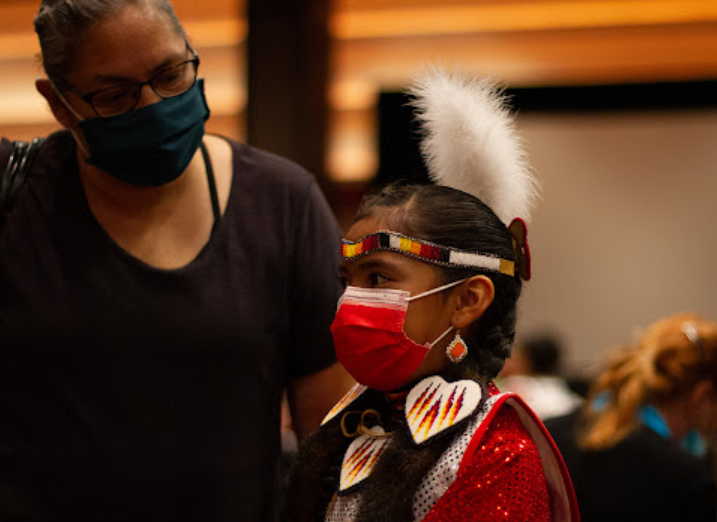
- Details
- By Native News Online Staff
The National Indian Council on Aging (NICOA) has extended its Connected Indigenous Elders campaign until the end of the year. The campaign began just after Labor Day in September. The national campaign was launched to address the issue of social isolation and loneliness among American Indian and Alaska Natives. The campaign aims to educate Native families about the health concern and recommend available resources.
Part of NICOA's outreach is to Native youth. During December, NICOA is attempting to ensure Native youth are engaging with their elders in tribal communities throughout Indian Country.
Want more Native News? Get the free daily newsletter today.
“We want to remind the youth of their obligation to help take care of their elders in our tribal communities, especially during this know, unprecedented time, where we're just now trying to getting back into some type of normalcy,” Desiree Lapahie, NICOA’s data analyst said to Native News Online. “We want to make sure they’re not so lonely or that they won’t get depressed.”
Laphie says there is a transition of the older generation passing away and the need to pass on the traditions and values held dear among tribal communities to the younger generations. One of the core values is taking care of elders, according to Laphie.
A benefit of seeing more youth get involved with caring for elders is the fact elders have so much to teach youth when it comes to teaching youth about their Native culture and heritage.
“I think, on both sides, both the youth wanting to learn more about you know, their own culture, their own heritage, and the elders wanting to teach them. “I think this is a great first step into trying to bridge the gap,” Lephie said
In order to gain the attention of Native youth, NICOA has a contest for youth, up to 25 years of age, to participate in.
Youth Elder Engagement Contest (from the NICOA website):
NICOA wants to remind youth of their obligation to help take care of their elders in our tribal communities as our elders are our keepers of our culture and language.
The Youth Elder Engagement contest will run from November 17 to December 17, 2021. Videos and photos posted before 12 a.m. Mountain Time December 17, 2021, will be eligible.
- To be eligible, a youth age 0 to 25 will need to show a photo of an elder, or include them in the video or photo for submission. All submissions must use hashtag #youthandindigenouselders and tag NICOA at @NICOAAging on Facebook, @NICOA_Aging on Twitter, or @nationalindiancouncilonaging on Instagram.
- Videos should be short, within one to three.
- When posting, please tell us your tribal affiliation or tribal territory and use the phrase, “This is how I engage with my elder …” and show the action, for example, video chatting with your elder, walking, baking, beading, drumming, driving to appointments, etc. If submitting a photo, please include tribal affiliation or tribal territory and a short description of how you engage with your elder in the social media post.
- Only one entry per person.
- Drawing will be held on December 17. Recipients will be notified by a social media post on NICOA’s social media channels, Facebook, Twitter and Instagram. Recipients may also be sent a message via those channels.
- Please allow up to two to three weeks for card delivery.
- By entering this contest, you give NICOA the permission to repost or share contest entry on its social media channels for contest promotion and educational purposes. Photo credit will be given to the originator.
CLICK to learn more about the Youth Elder Engagement Contest.
More Stories Like This
Native News Weekly (August 25, 2024): D.C. BriefsUS Presidents in Their Own Words Concerning American Indians
Two Murdered on Colville Indian Reservation
NDAA passes House; Lumbee Fairness Act Advances
NFL, Vikings to Host Native All-American Game, Youth Flag Clinic
Help us defend tribal sovereignty.
At Native News Online, our mission is rooted in telling the stories that strengthen sovereignty and uplift Indigenous voices — not just at year’s end, but every single day.
Because of your generosity last year, we were able to keep our reporters on the ground in tribal communities, at national gatherings and in the halls of Congress — covering the issues that matter most to Indian Country: sovereignty, culture, education, health and economic opportunity.
That support sustained us through a tough year in 2025. Now, as we look to the year ahead, we need your help right now to ensure warrior journalism remains strong — reporting that defends tribal sovereignty, amplifies Native truth, and holds power accountable.
 The stakes couldn't be higher. Your support keeps Native voices heard, Native stories told and Native sovereignty defended.
The stakes couldn't be higher. Your support keeps Native voices heard, Native stories told and Native sovereignty defended.
Stand with Warrior Journalism today.
Levi Rickert (Potawatomi), Editor & Publisher

